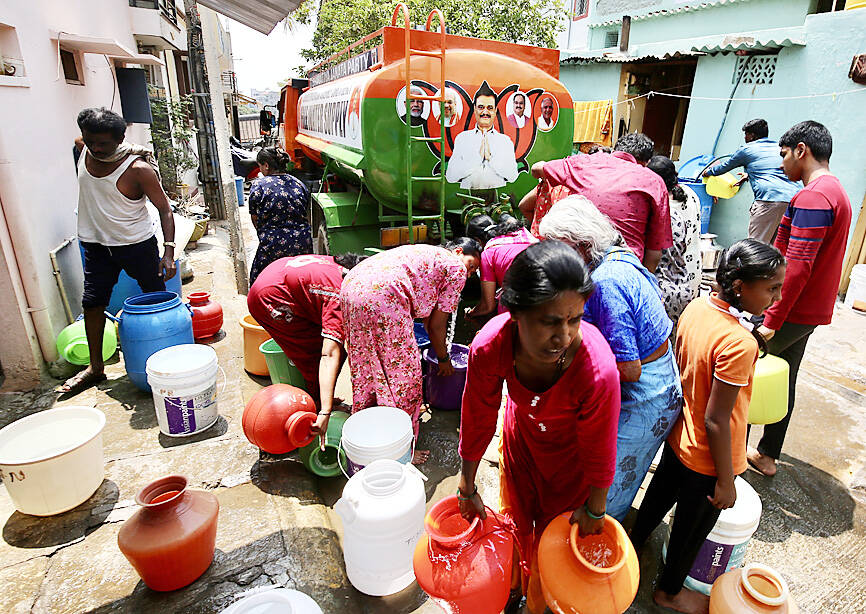CLIMATE CHALLENGES: The excessive use of groundwater and global warming have worsened the crises in Indian cities as temperatures can climb up to 40°C
India’s tech hub of Bengaluru is struggling with water shortages amid a drought, with the crisis expected to escalate as summer approaches.
Authorities are supplying water to residents in the city of 13 million people using tankers as a lack of rainfall dries up thousands of underground water sources. The Karnataka government has imposed a cap on how much the tanker suppliers can charge to prevent price gouging.
Bengaluru is home to the country’s US$194 billion information technology services industry. The crisis was a long time coming, said Shashank Palur, a Bengaluru-based hydrologist with the think tank Water, Environment, Land and Livelihood Labs.

Photo: EPA-EFE
“Bengaluru is one of the fastest growing cities in the world and the infrastructure for fresh water supply is not able to keep up with a growing population,” he said.
Indian cities have intermittently struggled with water shortages due to the over-use of groundwater and climate change causing a shift in the weather and reducing much-needed rainfall. With summer approaching, temperatures can climb to as high as 40°C, exacerbating the situation.
El Nino, a natural phenomenon that affects weather patterns worldwide, along with the city receiving less rainfall in recent years mean “recharge of groundwater levels did not happen as expected,” Palur said.
A new piped water supply from the Cauvery River, about 100km from the city, has also not been completed, he said.
Residents should use water “very judiciously” and for essential purposes only, Bengaluru Water Supply and Sewerage Board chairman Ram Manohar told a news channel earlier this month.
About a third of the city’s residents depend on groundwater, the Associated Press reported, citing authorities as saying some of the 13,900 wells in the city have been drilled to 457m.
About 7,000 wells have dried but authorities are making other arrangements, Karnataka Deputy Chief Minister D.K. Shivakumar said last week, adding that there is no crisis.
Identifying other sources and using them smartly, for example by reusing treated wastewater in the city “so that the demand for fresh water reduces,” could also help, Palur said.
Rapid urbanization has also contributed to the water shortage in the country. In 2019, Chennai in Tamil Nadu had a water crisis for weeks due to heatwaves and a bad monsoon in 2018.
Comments will be moderated. Keep comments relevant to the article. Remarks containing abusive and obscene language, personal attacks of any kind or promotion will be removed and the user banned. Final decision will be at the discretion of the Taipei Times.




















